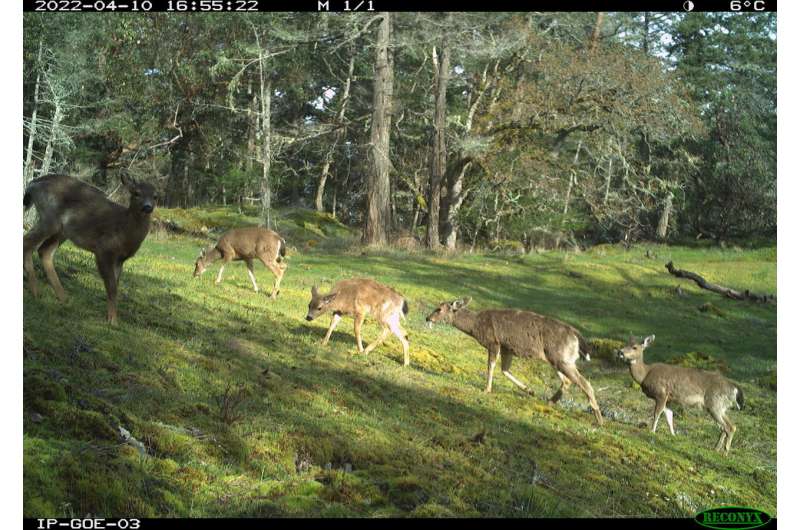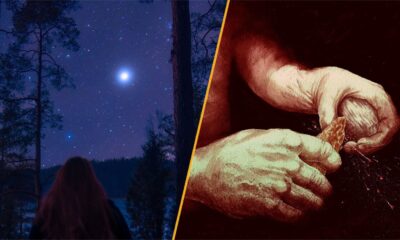Science
Indigenous-led Hunting Proven Most Effective for Deer Management in B.C.

A recent study led by the University of British Columbia (UBC) has found that Indigenous-led hunting is the most effective strategy for managing the overpopulation of black-tailed deer on the Southern Gulf Islands in British Columbia. This research, conducted in collaboration with Coast Salish Nations and various regional partners, highlights the pressing need to address ecological degradation caused by unchecked deer populations.
The study, published in the journal People and Nature on November 21, 2025, reveals that deer populations in the region are now estimated to be up to 10 times higher than they were a century ago. This surge is attributed to a combination of human-altered landscapes, restrictions on hunting, and the decline of natural predators. As a result, these deer are overbrowsing vegetation, hindering forest regeneration, reducing biodiversity, and disrupting cultural ties to the land.
Dr. Tara Martin, who has led nearly two decades of research on this issue, stated, “For most people, these islands look beautiful and natural, but they are entirely degraded. The change has been so slow, most people don’t recognize this shift.” The consequences are becoming increasingly stark, particularly for the Garry Oak meadow, one of British Columbia’s most endangered ecosystems, which is now at risk of irreversible collapse due to overgrazing.
Complex Decision-Making for Ecosystem Health
Formulating effective deer management strategies presents inherent complexities, especially when balancing ecological and cultural needs. According to lead author and doctoral student Sofie McComb, “This study offers a roadmap to help unpack complicated problems where many values and goals compete.” The research emphasizes that hyperabundant deer not only harm ecosystems but also pose challenges for communities globally, a sentiment echoed in regions such as Haida Gwaii, Ontario, Australia, New Zealand, and New Caledonia.
The team explored various management strategies, including Indigenous-led hunting, enhancing predator viability, employing deer reduction specialists, and increasing licensed hunting. Among these, Indigenous-led hunting emerged as the only strategy likely to achieve significant ecological and cultural benefits. It was estimated to increase the likelihood of maximizing human and ecological well-being by nearly 60% and project uptake and implementation goals by over 50%.
In contrast, while increased licensed hunting was deemed cost-effective from a Western scientific perspective, it was found to offer less than 30% likelihood of achieving meaningful long-term benefits.
The High Cost of Inaction
Experts caution that maintaining the status quo will not remedy the current ecological crises and may further entrench decision-making paralysis driven by fears of controversy. “If we don’t do something soon, the ecosystems will not be recoverable,” warned McComb. “Inaction is action—it’s the action that has been chosen, and the ecosystem is suffering.”
The study outlines a transparent framework for communities grappling with similar issues worldwide. By integrating diverse knowledge systems and weighing feasibility alongside ecological and cultural benefits, decision-makers can chart a path toward recovery that is both effective and socially grounded.
Dr. Martin emphasized the potential for positive outcomes: “It’s possible to find solutions to complex environmental issues that are good for people, the land, and the deer. This work shows that restoring cultural sovereignty and ecosystem health can go hand in hand.”
This research not only contributes to the local context but also provides insights applicable to global challenges related to managing hyperabundant herbivores, illustrating the vital role of inclusive strategies in environmental decision-making.
-

 Science1 month ago
Science1 month agoNostradamus’ 2026 Predictions: Star Death and Dark Events Loom
-

 Technology2 months ago
Technology2 months agoOpenAI to Implement Age Verification for ChatGPT by December 2025
-

 Technology6 months ago
Technology6 months agoDiscover the Top 10 Calorie Counting Apps of 2025
-

 Health4 months ago
Health4 months agoBella Hadid Shares Health Update After Treatment for Lyme Disease
-

 Health5 months ago
Health5 months agoAnalysts Project Stronger Growth for Apple’s iPhone 17 Lineup
-

 Technology4 months ago
Technology4 months agoElectric Moto Influencer Surronster Arrested in Tijuana
-

 Education5 months ago
Education5 months agoHarvard Secures Court Victory Over Federal Funding Cuts
-

 Health5 months ago
Health5 months agoErin Bates Shares Recovery Update Following Sepsis Complications
-

 Technology6 months ago
Technology6 months agoDiscover How to Reverse Image Search Using ChatGPT Effortlessly
-

 Technology7 months ago
Technology7 months agoMeta Initiates $60B AI Data Center Expansion, Starting in Ohio
-

 Technology7 months ago
Technology7 months agoRecovering a Suspended TikTok Account: A Step-by-Step Guide
-

 Science3 months ago
Science3 months agoStarship V3 Set for 2026 Launch After Successful Final Test of Version 2





















